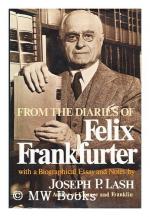|
This section contains 397 words (approx. 2 pages at 300 words per page) |
Encyclopedia of World Biography on Felix Frankfurter
Felix Frankfurter (1882-1965), an associate justice of the U.S. Supreme Court, demonstrated a strong sense for civil liberties.
Felix Frankfurter was born in Vienna, Austria, on Nov. 15, 1882. At the age of 12 he and his six brothers and sisters were taken to the United States. Life on the East Side of New York City served as the background for Frankfurter's social interests.
Following graduation from the College of the City of New York in 1902, Frankfurter entered Harvard Law School. He became editor of the Harvard Law Review and earned his degree in 1906 with honors. Henry Stimson, the U.S. attorney for the Southern District of New York, appointed Frankfurter an assistant in 1906. When President William Howard Taft named Stimson secretary of war in 1911, Stimson took Frankfurter along as law officer of the Bureau of Insular Affairs.
Frankfurter returned to Harvard Law School as a professor in 1914. Eventually he was named the first Byrne professor of administrative law. His Harvard years were broken by government service during World War I. As a special assistant to the secretary of war, and later in the same capacity to the secretary of labor, he helped formulate policy. Again at Harvard, Frankfurter became involved in numerous cases of national prominence: the Scopes trial (1925), the silk strike in New Jersey, and the attempt to suppress the American Mercury in Boston. He fought for the release of Nicola Sacco and Bartolomeo Vanzetti in 1927 and helped found the American Civil Liberties Union. During Franklin D. Roosevelt's presidency Frankfurter worked on the Security Exchange Act of 1934 and helped formulate the Utility Holding Company Act.
Frankfurter was made a Supreme Court justice in 1939. From the beginning his opinions were challenged as extremely liberal. However, he took a resolute position on the Constitution and its place in American society. He understood that this document could survive only so long as the Court guarded its prerogatives.
Decisions in the civil rights area found Frankfurter strongly for the individual. His opinion on the movie The Miracle was typical. When the highest court in New York State ruled the film sacrilegious, Frankfurter saw this as an invasion of private rights. He was also strongly opposed to congressional committees and their investigating procedures.
Frankfurter had married Marion A. Denman after World War I. The marriage produced no children, and during World War II the Frankfurters adopted three English refugee children.
|
This section contains 397 words (approx. 2 pages at 300 words per page) |


